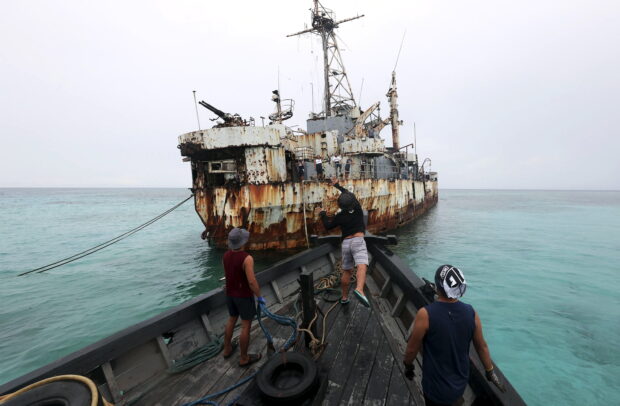China claims Ayungin Shoal has never been part of PH

Members of a resupply mission approach the grounded BRP Sierra Madre at Ayungin (Second Thomas) Shoal, one of the nine outposts guarding the West Philippine Sea, to replenish supplies for its troops. (INQUIRER FILE PHOTO)
MANILA, Philippines — The Chinese Foreign Ministry on Monday once again aired its claim over Ayungin Shoal, saying that the territory was never once owned by the Philippines.
In a strongly-worded statement, the ministry said Ayungin Shoal, which it called Ren’ai Jiao, was “completely beyond the limits” of Philippine territory.
“The Philippines has no legal basis at all to claim sovereignty over Ren’ai Jiao on the grounds of its comparative proximity to Philippine territory,” it said, saying that Philippine territory was defined by a series of international treaties.
The historic ruling of the Permanent Court of Arbitration in The Hague in 2016 favored the Philippines in its claims in the West Philippine Sea.

But China continues to claim its sovereignty over most of the South China Sea, including the West Philippine Sea which sits well within the Philippines’ exclusive economic zone.
In its statement, the ministry addressed the arbitral ruling, saying: “The arbitration initiated by the Philippines directly concerns the issues of territorial sovereignty and maritime delimitation. Territorial issues are not subject to [the] United Nations Convention on the Law of the Sea (UNCLOS). Besides, in 2006, pursuant to Article 298 of UNCLOS, China excluded issues relating to sea boundary delimitations from the jurisdiction of a court or tribunal.
“By unilaterally initiating the South China Sea arbitration, the Philippines contravened the stipulations of UNCLOS. The Arbitral Tribunal violated the principle of state consent, exercised its jurisdiction ultra vires and rendered an award in disregard of the law. Such an award is illegal, null and void, and completely invalid.”
READ: Don’t ‘stir up trouble’, China urges PH after PCG removes shoal barrier
READ: PH to take appropriate measure to protect its sovereignty, says DFA
Meanwhile, the statement also covered the Philippines’ grounding of BRP Sierra Madre at Ayungin Shoal.
This act, the statement said, violates China’s territorial sovereignty. It also accused the Philippine government of “going back on its words,” as it supposedly “promised” to tow away the vessel several times.
The Philippines has denied that it made any such promise. So it continues its resupply missions to troops stationed at the BRP Sierra Madre.
The ministry statement also criticized the resupply missions, saying: “For some time, the Philippines, ignoring China’s goodwill and sincerity, has kept sending official vessels and warships to forcibly intrude into the adjacent waters of Ren’ai Jiao in an attempt to send construction materials for repairing and reinforcing the grounded military vessel on a large scale in order to permanently occupy Ren’ai Jiao.”
Recently, China urged the Philippines to “stop making provocations and creating troubles at sea and stop groundless attacks and smears.”
China vowed to “do what is necessary” to safeguard its “territorial sovereignty” and “maritime rights.”
atm
For comprehensive coverage, in-depth analysis, visit our special page for West Philippine Sea updates. Stay informed with articles, videos, and expert opinions.